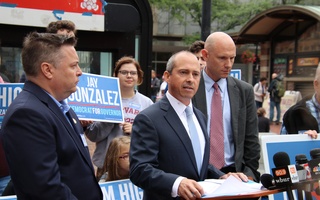{shortcode-bd0fd0e3a34110211f9570f92d3048c436ab39d6}
This past week, Harvard closed out a record-breaking campaign, raising $9.6 billion. The campaign is an extraordinary financial achievement and speaks to the phenomenal generosity and devotion of the Harvard network. We congratulate the Harvard administration on the achievement, and especially on the $1.3 billion raised specifically for financial aid.
Nevertheless, we urge the administration to practice fiscal caution with the funds that have been raised. Not only does Harvard face the first year of a new federal endowment tax on the income generated by the endowment, but the Democratic candidate for Massachusetts governor Jay Gonzalez is proposing a new tax on University endowments. Unlike the federal tax, this new proposal would tax the assets of Harvard’s endowment, costing the University over ten times as much.
Already, the federal tax will be a significant burden to the University endowment. Administrators estimated that in 2017, the tax would have cost the University $43 million. Administrators note that the tax limits the University’s programs to spend on important research, as well as financial aid programs that are integral to Harvard’s support of low-income students. If this tax is now Harvard’s reality, then Gonzalez’s plan is only more concerning. His plan would cost the University over $500 million.
It follows that Harvard must be incredibly thoughtful about how it spends and more importantly saves the funds it has acquired as a result of the capital campaign. Though current use giving — or donations that could be spent as soon as they came in — was an exciting part of the campaign, we believe that immediate usage of the funds may not be the best for the University’s financial health. Though Gonzalez’s election is unlikely against popular incumbent Republican Charlie D. Baker ’79, the University should be preparing itself for a scenario in which it faces both the current federal and the proposed state tax, which is notably supported by Cambridge Mayor Marc C. McGovern.
That being said, we are eager to see Harvard redouble its commitment to financial aid and the ongoing house renewal project. The $1.3 billion the University raised exclusively for financial aid is a remarkable accomplishment, and we hope the University continues to prioritize the program in its fundraising and expenditure. The program marks one of Harvard’s most critical contributions to higher education and society as a whole, and we hope the University continues to lead the way in supporting low-income college students.
Likewise, the house renewal project has been a critical part of improving undergraduate life, especially as the University seeks to limit the sway of unrecognized single-gender social organizations on undergraduate student life. We look forward to the completion of Lowell House and the commencement of work on Adams House thereafter.
All who gave to and worked on the capital campaign should be applauded for this financial achievement. However, the new federal endowment tax and the threat of an even more burdensome state one necessitate that the University proceed with fiscal caution.
This staff editorial is the product of discussions at regular Editorial Board meetings. In order to ensure the impartiality of our journalism, Crimson editors who choose to opine and vote at these meetings are not involved in the reporting of articles on similar topics.
Read more in Opinion
It’s a Job Interview, Not a TrialRecommended Articles
-
Trouble in Financial Aid TownHarvard’s generosity when it comes to financial aid is indeed a blessing for many of us. However, this does not imply that the process, too, of receiving financial aid is free of difficulties.
-
End the Endowment TaxThe endowment tax is a calculated disregard for the important role of research in American society at a time when even facts are under constant attack by our leaders.
-
 With Endowment Tax on the Horizon, Harvard Still Doesn’t Know How to File Its Returns
With Endowment Tax on the Horizon, Harvard Still Doesn’t Know How to File Its Returns -
 Endowment Tax Proposal Represents New Attack on Harvard, Higher Ed
Endowment Tax Proposal Represents New Attack on Harvard, Higher Ed -
Dissent: Harvard’s Own Manifest DestinyWe believe the tax on Harvard’s endowment could be put to use by giving money back to the community that Harvard has been taking from for centuries.













